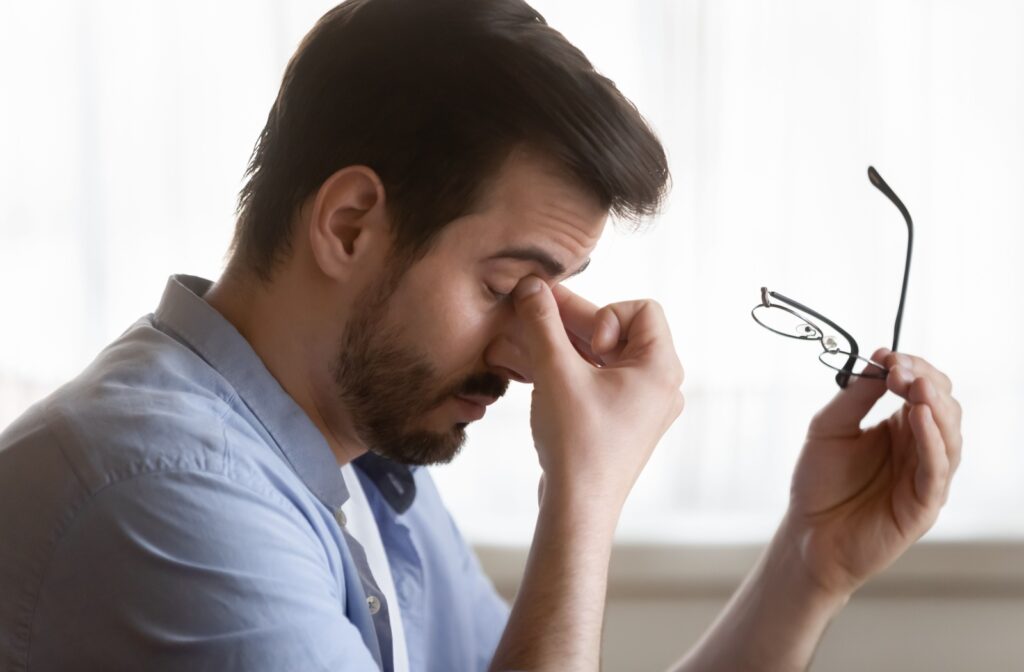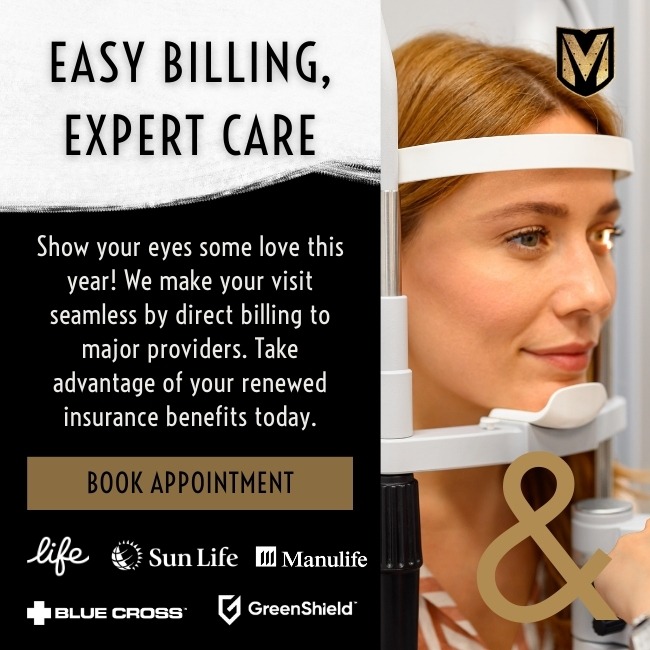Dry eyes are more than just a mild inconvenience—they can significantly impact your daily life, often in ways you might not immediately attribute to the condition. For example, dry eyes can cause blurriness, a surprising yet common symptom.
Dry eye syndrome can cause several uncomfortable symptoms and potentially lead to complications if left untreated. So, you should book an eye exam and discuss your symptoms with your eye doctor if you are experiencing dry eyes. They can examine your eyes and offer tailored advice to keep your eyes feeling fresh and healthy.
What Is Dry Eye?
Tears are critical for maintaining eye health as they lubricate the surface, remove irritants, reduce the risk of infection, and keep your vision sharp. Dry eye syndrome, or “dry eye,” occurs when your eyes don’t produce enough quality tears to keep them properly lubricated. When this essential moisture is compromised, it can wreak havoc on your eyes and vision.
Common Symptoms of Dry Eyes
Dry eye is a complex condition that can manifest with various symptoms; you may experience some or all of the following with dry eyes:
- A stinging, burning, or scratchy sensation
- Light sensitivity
- Difficulty wearing contact lenses
- Fatigued eyes, especially with prolonged screen use
- Redness in the eyes
- Stringy mucus around the eyes
- Feeling like something is stuck in your eye
- Blurry vision
- Watery eyes (your body’s overcompensation to the dryness)
It may be tempting to “tough it out” when experiencing dry eyes. But it’s essential to note that untreated, severe dry eye syndrome can lead to painful complications like corneal abrasions.
How Do Dry Eyes Cause Blurriness?
To understand why dry eyes lead to blurry vision, it helps to consider the role tears play in keeping your eyesight clear. Your tear film—the thin layer of moisture that coats the surface of your eyes—has 3 components (oil, water, and mucus) that work together to ensure smooth, even light refraction. When dryness disrupts this film, light can scatter inconsistently when it enters the eye.
If you’ve noticed blurry vision developing throughout the day, this may be linked to the natural progression of dry eye symptoms. Tears break down over time and expose your eyes to environmental stressors like screens, air conditioning, or dry weather.

What Causes Dry Eyes?
So, how do we prevent blurriness from dry eyes? You try to avoid the dryness in the first place.
Several factors contribute to developing dry eyes, including environmental, health-related, and lifestyle causes.
Environmental causes:
- Climate: Windy, cold, or dry weather conditions can accelerate tear evaporation
- Screen time: Staring at smartphones, computers, or TVs reduces blinking frequency, which can contribute to dryness
- Air quality: Exposure to smoke, air conditioning, or other airborne irritants can dry out the eyes
Health-related causes:
- Hormonal changes, particularly during menopause
- Autoimmune disorders such as Sjögren’s syndrome
- Certain medications, including antihistamines, antidepressants, and blood pressure drugs
- Age-related tear production decline
Lifestyle factors:
- Prolonged use of contact lenses without proper hydration
- Lack of omega-3 fatty acids or hydration in your diet
- Insufficient sleep or poor-quality sleep
None of these things in isolation guarantees you’ll get dry eyes, but you may notice a combination of these factors contributing to your symptoms. This combination of factors makes it essential to tackle the condition holistically.
Treating & Managing Dry Eyes
Fortunately, there are numerous ways to treat and manage dry eyes and alleviate blurry vision—these range from at-home solutions to medical interventions. Your eye doctor can recommend what should be most effective in your situation based on the cause of your dry eyes.
Home remedies:
- Artificial tears: Over-the-counter lubricating drops can quickly restore moisture to your eyes—opt for preservative-free options for long-term use
- Warm compresses: Applying a warm compress helps unclog blocked glands and can improve tear quality
- Taking breaks: Follow the 20-20-20 rule—every 20 minutes, look at something 20 feet away for 20 seconds to reduce screen strain and allow your eyes to relax—this break also allows you to blink more frequently
- Hydration: Ensure you are drinking enough water throughout the day—adequate hydration is excellent for your body in addition to helping keep your eyes moist
Medical treatments:
- Prescription drops: Your eye doctor may prescribe oral medication or medicated eye drops for various reasons, including tear stimulation or to reduce inflammation
- Punctal plugs: These small devices block the openings of your tear drainage ducts to help your eyes retain moisture for longer
- Intense pulsed light (IPL) therapy: IPL therapy uses pulsed light waves to stimulate oil flow, which can be beneficial for meibomian gland-related dry eye syndrome
Protect Your Eyes, Protect Your Vision
Blurred vision linked to dry eyes can disrupt your life, but it’s not something you have to live with. You can enjoy better eye health and clearer vision by recognizing symptoms, addressing causes, and taking proactive steps toward treatment.
If your symptoms persist or worsen despite home remedies, contact us at Milton Vision & Sports Vision Training Centre to book an appointment with one of our experienced eye doctors. We can examine your eyes and offer tailored advice on effective treatment options.



